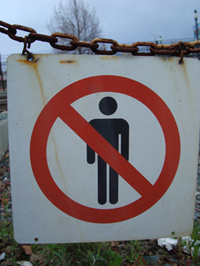
Your complimentary articles
You’ve read one of your four complimentary articles for this month.
You can read four articles free per month. To have complete access to the thousands of philosophy articles on this site, please
Articles
Thinkers Against Xenophobia: How To Deal with Pride and Prejudice
by Anja Steinbauer
Who are you, and who am I? As a reader of Philosophy Now you have probably come across such questions many times. We ask them in metaphysics, the philosophy of mind, epistemology, as well as the philosophy of psychology and related areas. However, nowhere does the problem of the supposed identity of self and other wreak havoc as it does in the area of human relationships – moral, social and political.
When we think about who we are, we also think about who we are not; we define ourselves off against an ‘other’. How do we deal with the existence of the other? G.W.F. Hegel thought that the encounter between two self-conscious beings is best described as a ‘life-and-death’ struggle. Luckily, not all encounters with others are like that. We can develop sincere bonds, friendships that mean happiness rather than a threat. However, as the existence of racism, xenophobia, sexism and other kinds of prejudice suggest, there is plenty of potential for it to go wrong.
Why do we ever react to the existence to other people with prejudice and rejection? Many explanations of the causes of prejudice have been suggested. Philosophical, psychological and sociological theories abound: social inequality, peer pressure, the desire to elevate one’s own status, the ‘horns effect’, in-group bias, tribalism and many more. Immanuel Kant thought that prejudice arises from a natural preference for oneself and one’s interests over those of others. However, although this kind of ‘logical egoism’ affects most of us, it is the ability to relativise this selfishness and put it in proper social perspective that allows us to overcome prejudice.

One of the worst forms of prejudice, and strangely also perhaps the one that is easiest to understand is xenophobia: we tend to fear what we don’t know, and we exaggerate what we’re afraid of. There seem to be so many things that divide us, and in a climate of social uncertainty and injustices it is tempting to focus on these. We have seen the rise of this to a worrying degree in all corners of the globe.
There are many reasons to be deeply worried about xenophobia and other forms of social prejudice: reasons connected with flawed moral thinking, reasons having to do with devastating political and social consequences. In many ways, prejudice is the nemesis of the philosopher. It is one of the things to which Philosophy Now tries to draw attention with its annual Award For Contributions in the Fight Against Stupidity: prejudice annuls truth.
Arthur Schopenhauer was one of those extraordinary thinkers who early on recognized this dangerous power of prejudice: “The discovery of truth is prevented more effectively, not by the false appearance things present and which mislead into error, not directly by weakness of the reasoning powers, but by preconceived opinion, by prejudice.” What makes prejudice so tricky to expose for what it is and fight effectively is that often it is shared and thereby reinforced, sometimes even a majority view and generally held to be true. Mary Wollstonecraft observes that “when any prevailing prejudice is attacked, the wise will consider, and leave the narrow-minded to rail with thoughtless vehemence at innovation.”
We must do more than that. We must calmly and constructively, yet unrelentingly challenge prejudice wherever we find it. I believe that this is at the heart of what Hannah Arendt wants to say when she says that human lives can only find true fulfillment in the political context.
When Nietzsche referred to the philosopher as a dangerous explosive in the presence of which nothing is safe – he was right. Philosophy can unmask our own prejudices as well as show up those of others. This is what we intend to do over the next few months and years, and should it be necessary to the end of our lives. We want to explore the issues concerning xenophobia, its roots, forms and rationality, the nature of prejudice generally, racism, sexism and homophobia, multiculturalism, globalisation, democracy in a globalised world, and overcome prejudice by honest and constructive dialogue.
Philosophy Now calls on all thinkers of the world, inside and out of academia, to join us in taking a stand against xenophobia. We believe that to fight prejudice in all its forms is a major responsibility of all thinking individuals. In order to raise awareness of these issues we will organise a number of events, which we will advertise on our website (philosophynow.org) and on Facebook. We also invite articles on all aspects of xenophobia and general prejudice, as well as about relevant values such as cosmopolitanism and solidarity.
Join us in our battle against xenophobia! Albert Einstein is rumoured to have bemoaned the fact that “it is harder to crack a prejudice than an atom.” The atom has been cracked; prejudice is next.
© Dr Anja Steinbauer 2016
Anja Steinbauer teaches at the London School of Philosophy and is an Editor for Philosophy Now.









